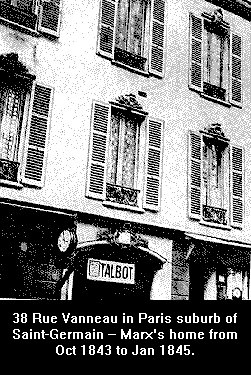Marx/Engels Works 1844
The Economic and Philosophical Manuscripts
by Karl Marx
Written: between April and August 1844 in Paris;
First Published: 1932 (the manuscripts had been thereto lost) in German, by the Institute of Marxism-Leninism in the Union of Soviet Socialist Republics;
Translated: Gregor Benton in 1974; the alternate translation was the first English translation, made in 1959 by Martin Milligan of Progress Publishers;
Transcription: Zodiac; second translation transcribed by Andy Blunden;
Online Version: Marx/Engels Internet Archive (marxists.org) 1993.

Written by Karl Marx between April and August 1844 while living in Paris. It was during this period that Marx and Engels would meet and become friends.
<"001"> The first thing to realize in reading this (now-famous) text is that it is a very rough draft and was by no means intended for publication as is. It represents Marx's first foray into analyzing political economy -- a pursuit he'd undertake doggedly over the coming decades, leading ultimately to Capital.
<"002"> Marx's research into political economy convinced him a larger published work was possible. On February 1 1845, he signed a contract with Darmstadt publisher Carl Leske for a book to be titled A Critique of Politics and of Political Economy. It was never completed for a variety of reasons and Leske cancelled the deal in September 1846, wanting to distance himself from the controversial political refugee.
<"003"> NOTE: Substantial portions of the manuscripts have never been found, the most extreme case being the Second Manuscript, of which only pages 40-43 remain. Also note that the subheaders used in the Third Manuscript are not Marx's and are added to facilitate reading and organization, following the general style Marx established in the subheadings of the First Manuscript.
Contents
Wages of Labor
Profit of Capital
Capital
The Profit of Capital
The Rule of Capital over Labour and the Motives of the Capitalist
The Accumulation of Capital and the Competition among the Capitalists
Rent of Land
Estranged Labor
The Relationship of Private Property
Private Property and Labor
Private Property and Communism
Need, Production and Division of Labor
Money
Critique of Hegel's Dialectic and General Philosophy